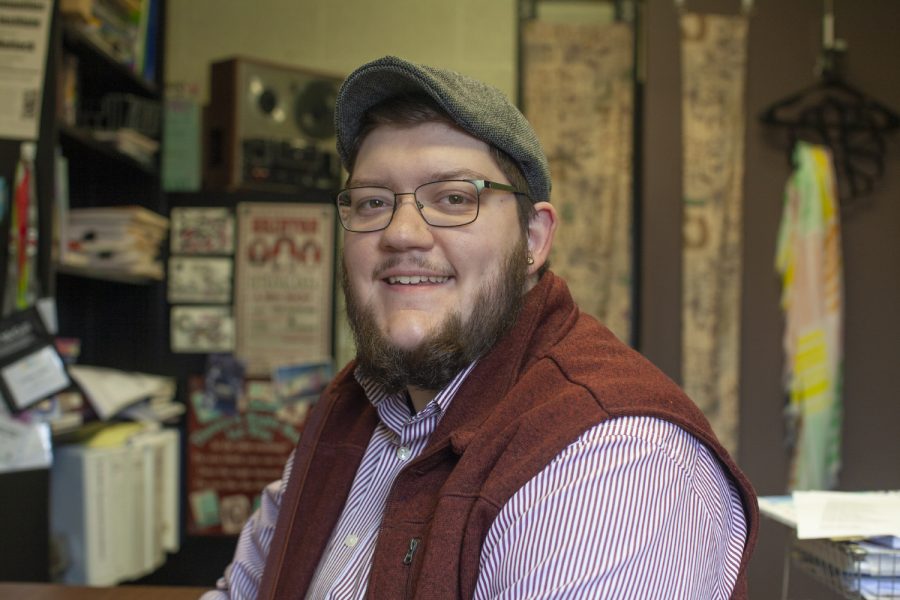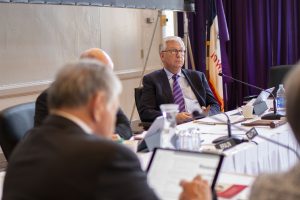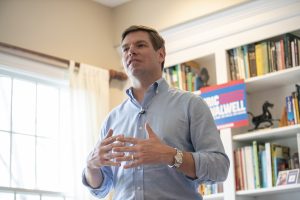Obermann Center grant explores Humanities for Public Good program
The Obermann Center is exploring a Humanities for Public Good program, which would provide graduate students in that area with less conventional and more creative career paths.
University of Iowa graduate student Aiden Bettine poses for a portrait on Tuesday, April 23rd, 2019. Aiden Bettine is the first Humanities for Public Good Graduate Fellow. (Tate Hildyard/ The Daily Iowan).
April 29, 2019
Students pursuing a doctorate in the humanities typically default to a traditional academic track position as soon as they hit the job market. However, the University of Iowa Obermann Center is dedicated to changing that culture with its Humanities for Public Good grant.
The Humanities for Public Good grant aims to create an interdisciplinary Ph.D. for humanities doctoral students who might want to pursue a less conventional and more creative career in that area. UI doctoral candidate Aiden Bettine is the first graduate fellow with the grant.
“It’s a really exciting kind of graduate-assistantship role to help that new grant launch here on campus,” Bettine said. “Part of it is about shifting our own awareness concerning not only job opportunities but the values of our skills right outside a traditional tenure track.”
The Humanities for Public Good program makes it easier for graduate students to decide what to do with their degrees, he said. For example, he said, a new summer internship will give them tangible, hands-on job experience in humanities outside traditional academic research.
“The goal of the grant is to actually develop a new and innovative, interdisciplinary Ph.D. program in the humanities to see how transferrable and translatable humanities Ph.D. skills actually are in more so the nonprofit world,” he said.
RELATED: UI uses $1.6 million in grants to focus on humanities research
Bettine said he has been involved with the Obermann Center since he arrived on campus, participating in workshops and events before receiving the Humanities for Public Good graduate fellowship. It seemed like a natural fit, he said, to begin working there in an official capacity.
Primarily, he said, he does website work for the Humanities for Public Good fellowship, such as web development, different pages for events, event planning and support, among other items.
UI Ph.D. student Victoria Burns, the program’s next fellow, called his contributions inspirational.
“He’s very innovative, so he has things that he cares about, but then, he’s very good at thinking about how to actually approach them in a creative way that would then serve the community that he wants to work with, which is important,” Burns said.
She is really excited to continue Bettine’s work, she said. Thinking about the humanities in a different way than usual is a very personal passion of hers.
“It’s creating a community that has graduate students and has faculty but also has staff and also has people from all different departments,” Burns said. “It’s building this sort of microversion of the university with a bunch of people who want to do what the grant is trying to do.”
Different perspectives are what drew Burns to the Humanities for Public Good in the first place, because she prefers creative applications to pursuing a tenured track position.
Obermann Center Director and principal investigator of the Humanities for Public Good Teresa Mangum said the $1.4 million, four-year grant by the Andrew W. Mellon Foundation is a tribute to the UI humanities students, staff, and faculty.
“We often see dire statistics about the lack of positions for tenure-track faculty, but I believe we need people who understand history and cultural differences working in every possible context,” she said.
The grant serves to prepare scholars for working in libraries, publishing, public policy, nonprofits, technology, and entrepreneurship, she said. The Advisory Board of UI graduate students, staff, and faculty will develop new opportunities for graduate students, she said.
“The graduate fellow and our postdoctoral fellow will work closely with this group as project managers, researchers, event organizers, documentarians, and more,” Mangum said.






